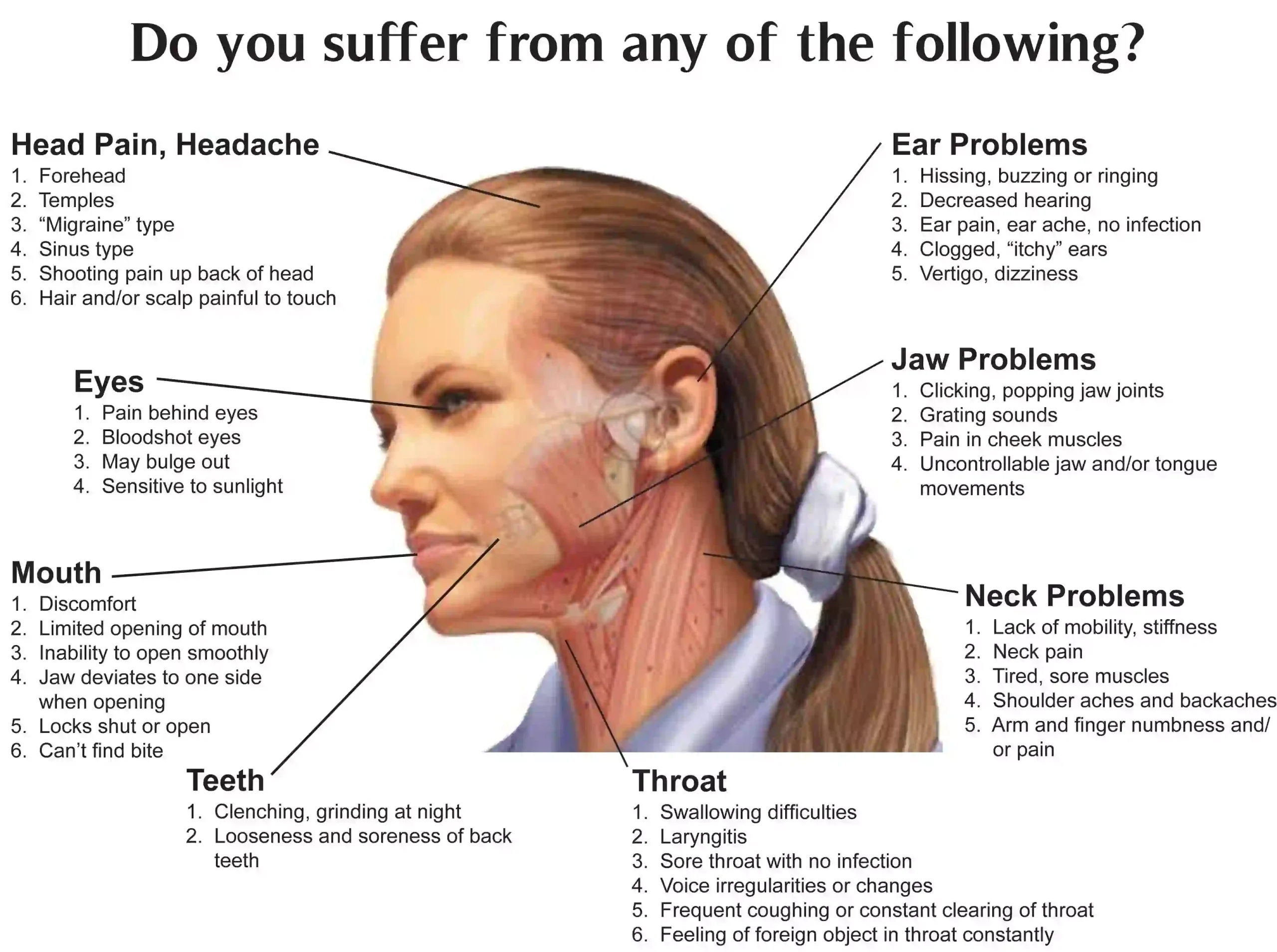Do you experience frequent headaches along with tooth pain? If yes, then you are not alone. Tooth pain and headaches can be interrelated to each other in various ways. In this blog, we will explore the connection between tooth pain and headaches in detail.
We will delve into topics like the concept of referred pain, teeth grinding (bruxism), health conditions that cause both tooth pain and headaches, impact of sinus infections, temporomandibular joint disorder, trigeminal neuralgia, and more.We will also discuss various home remedies for relief and when to seek professional help. Regular dental checkups and hygiene practices can play a vital role in reducing the risk of toothache-related headaches. So let’s get started!
1. Understanding the Link between Tooth Pain and Headaches

Trigeminal nerve inflammation from tooth damage can lead to head pain, while jaw tightening due to dental issues may result in migraine headaches. Dental pain can trigger headaches through nerve connections in facial structures, causing painful sensations in the head.
2. The Concept of Referred Pain
Understanding referred pain can aid in diagnosing toothache-induced headaches. Dental issues like toothaches may cause pain in other head areas. Referred pain from dental problems can manifest as headaches, transmitted through nerve connections, making identification crucial for headache management.
3. The Influence of Teeth Grinding (Bruxism)

Persistent teeth grinding can lead to discomfort in the jaw joint, triggering headache pain. Addressing bruxism is essential in preventing toothache-induced headaches. Managing bruxism can effectively reduce head pain.
4. Health Conditions That Can Cause Both Tooth Pain and Headaches
Health conditions like sinus infections, temporomandibular joint disorder, gum disease, tooth infections, and abscessed teeth can lead to both tooth pain and headaches. The proximity of the trigeminal nerve and the spread of infections are major contributors.
5. Impact of Sinus Infections

Sinus infections and toothache-related headaches often occur due to nerve connections and maxillary sinus inflammation. Understanding the involvement of cranial nerves is crucial, as dental pain can result in referred pain leading to headaches.
6. Temporomandibular Joint Disorder and its effects
Temporomandibular joint disorder affects the jaw joint, potentially leading to headaches. TMD can cause toothache pain and jaw discomfort, which may radiate to the head. Understanding the impact of TMD on cranial nerves is crucial in managing headache discomfort.
7. Trigeminal Neuralgia: What you need to know

Trigeminal neuralgia causes intense facial pain, affecting the trigeminal nerve responsible for facial sensations. Pain episodes can be triggered by simple activities, impacting a person’s quality of life significantly. It is often described as one of the most painful experiences.
8. The Role of Cavernous Sinus Thrombosis
Cavernous sinus thrombosis can stem from head, face, or dental infections. It causes severe, persistent headaches and facial pain with potential vision issues. Dental problems and sinusitis are common sources. Early dental issue treatment can prevent this condition.
9. Common Symptoms of Toothache-Induced Headaches

Toothaches, facial pain, and headaches often signal dental issues. Nausea or dizziness may accompany toothache-induced headaches, while jaw joint discomfort, lower jaw pain, and blood clot formation due to tooth problems can also trigger headache pain. Discomfort in the lower lip can be associated with these headaches.
10. Identifying Migraines from Toothaches
Throbbing head pain, nausea, and sensitivity to light often signify migraines. In contrast, toothaches cause localized jaw or tooth pain. Distinguishing these symptoms is crucial for accurate diagnosis and appropriate treatment. Understanding these distinctions can aid in timely and precise medical intervention.
11. Recognizing the Signs of Referred Tooth Pain

Pain from sinus infections can mimic a toothache, while heart-related pain may be felt in the lower teeth or jaw. Diagnosis of referred tooth pain can be challenging, making root cause understanding crucial for targeted treatment and proper care differentiation.
12. How to Effectively Manage Toothache and Headache
Effective management of toothache and headache involves utilizing over-the-counter pain relievers like ibuprofen, applying a cold compress, gentle jaw exercises, avoiding hard foods, and seeking professional dental care for long-term relief. These strategies can help alleviate discomfort and prevent aggravating the pain disorder.
13. Home Remedies for Relief

Applying a cold pack to reduce inflammation, rinsing with warm salt water for pain relief, consuming foods rich in vitamin C for dental health, gently massaging the jaw joint for tension, and engaging in relaxation techniques for headache relief are all effective home remedies for relief.
14. When to Seek Professional Help
Persistent tooth pain accompanied by headaches warrants a visit to a dentist or healthcare provider. Dental pain leading to headaches should prompt a visit to a healthcare provider. Seeking professional help is crucial if tooth pain is resulting in frequent headaches. Consult a healthcare provider if tooth pain is causing recurrent headaches.
15. The Role of Your Dentist in Managing Toothache Pain

Dental professionals have the expertise to identify and treat toothache-related headaches effectively. They can perform tooth extractions or root canals to address toothache pain, preventing it from leading to secondary headaches. Seeking professional help is crucial for managing toothache-related head pain.
16. Regular Dental Checkups and Their Importance
Regular dental checkups play a vital role in early identification and proactive management of dental issues that could lead to headaches. They are crucial for timely detection and prevention of dental concerns that may contribute to head pain.
17. Therapies and Treatments Available for Chronic Cases

Chronic tooth pain and associated headaches can be effectively managed through a variety of available therapies and treatments. From new toothache medications to advanced head pain therapies, there are diverse options for addressing chronic cases. Various treatments exist to alleviate the source of your pain and provide relief.
18. Are there Any Preventive Measures for Toothache-Related Headaches?
Preventing toothache-related headaches involves regular dental check-ups to address issues like cavities and gum disease. Maintaining good oral hygiene and wearing a dental night guard can also help reduce the risk of headaches. Early treatment for bruxism and TMJ issues is important in preventing toothache-induced headaches.
Frequently Asked Questions
What are some common causes of tooth pain that can also lead to headaches?

Tooth decay or cavities can trigger tooth pain, which may then lead to headaches. Additionally, sinus infections or inflammation can cause both tooth pain and headaches.
Teeth grinding or clenching, known as bruxism, can also result in tension headaches and jaw pain. Temporomandibular joint (TMJ) disorders are another common cause of tooth pain and headaches.
Should I see a dentist or a doctor if I am experiencing tooth pain and headaches?

If you are experiencing tooth pain and headaches, it is best to consult a dentist first. Dental issues can often cause headaches and other symptoms.
A dentist can examine your teeth and mouth for any signs of dental problems. If dental issues are ruled out, then you may need to see a doctor.
Are there any home remedies or over-the-counter treatments for tooth pain and headaches?

Home remedies and over-the-counter treatments can provide relief for tooth pain and headaches.
Try using over-the-counter pain relievers like ibuprofen or acetaminophen, applying a cold compress to the affected area, or using natural analgesics such as clove oil or peppermint tea. However, it’s crucial to see a dentist to identify the underlying cause of your tooth pain and headaches.
Conclusion
Tooth pain and headaches have a strong connection, and understanding this link can help you find relief. Toothaches can cause referred pain, where the pain is felt in a different area, such as the head. Teeth grinding (bruxism), sinus infections, and temporomandibular joint disorder (TMJ) can all contribute to tooth pain and headaches.
It’s important to seek professional help if you’re experiencing chronic toothache pain or frequent headaches. Your dentist plays a crucial role in managing toothache pain and can provide therapies and treatments for chronic cases. Regular dental checkups are essential for maintaining oral health and preventing toothache-related headaches.
Practicing good dental hygiene can also reduce the risk of headaches. If you’re experiencing tooth pain and headaches, don’t hesitate to consult with your dentist for proper diagnosis and treatment.
Read Also:
Myths vs Reality: Rotten Tooth Worms
Discover Chronos Body Health Benefits
Disadvantages of Deep Teeth Cleaning Explained